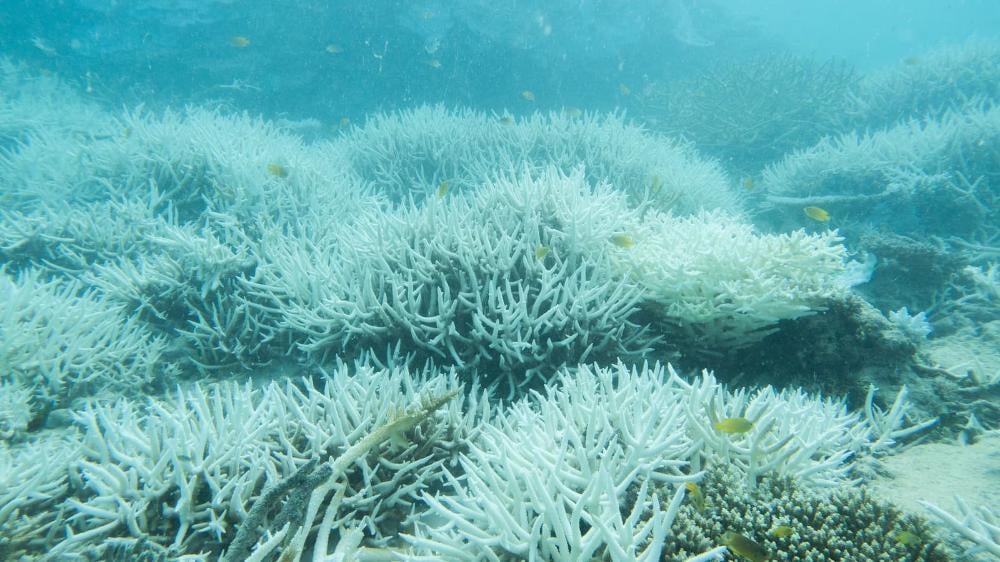This post was originally published on Eco Watch
Australia’s Great Barrier Reef — the world’s largest coral reef system — has been under critical pressure in recent years, with warming sea surface temperatures leading to mass coral bleaching that threatens its unique biodiversity, ecology and stunning beauty.
Temperatures in the Great Barrier Reef have reached the hottest in more than 400 years, new research has found, presenting an “existential threat” to the UNESCO World Heritage Site.
“Mass coral bleaching on the Great Barrier Reef (GBR) in Australia between 2016 and 2024 was driven by high sea surface temperatures,” the authors of the study wrote. “Without urgent intervention, the iconic GBR is at risk of experiencing temperatures conducive to near-annual coral bleaching, with negative consequences for biodiversity and ecosystems services. A continuation on the current trajectory would further threaten the ecological function and outstanding universal value of one of Earth’s greatest natural wonders.”
The researchers reconstructed 400 years of Coral Sea summer surface temperatures and found that recent extreme ocean heat has resulted in mass coral bleaching of the GBR, a press release from University of Wollongong (UOW) said.
A field of bleached coral on the Great Barrier Reef. Ove Hoegh-Guldberg
The research team, led by Dr. Benjamin Henley — a professor and honorary fellow at University of Melbourne — used geochemical data from previously collected coral cores in the region for the temperature reconstructions. They also looked at sea surface temperature simulations with and without the effects of climate change using climate models and found that the rising temperatures were the result of the human-caused climate crisis.
“When I plotted the 2024 data point, I had to triple check my calculations – it was off the charts – far above the previous record high in 2017. I could almost not believe it. Tragically, mass coral bleaching has occurred yet again this year,” Henley said in the press release.
Five of the six warmest years on record coincide with the recent Coral Sea mass bleaching events. The sea experienced the highest temperatures in 400 years in 2017, 2020 and 2024, with this year being the warmest by a wide margin. The next warmest three years were in 2004, 2016 and 2022.
“Climate model analysis confirms that human influence on the climate system is responsible for the rapid warming in recent decades. This attribution, together with the recent ocean temperature extremes, post-1900 warming trend and observed mass coral bleaching, shows that the existential threat to the GBR ecosystem from anthropogenic climate change is now realized,” the authors of the study wrote.
Last week, the UNESCO World Heritage Committee decided not to list the Great Barrier Reef as in danger, but scientists have said that, based on the new evidence, the reef is definitely at risk.
“In the absence of rapid, coordinated and ambitious global action to combat climate change, we will likely witness the demise of one of Earth’s most spectacular natural wonders,” Henley said. “When you compile all of the evidence we have, it’s the inevitability of the impacts on the reef in the coming years that really gets to me.”
Professor Helen McGregor, co-author of the study and a geologist and climate change researcher with UOW’s Environmental Futures, said urgent action is necessary to prevent the devastation of one of Earth’s most important ecosystems.
“There is no ‘if, but or maybe’—the ocean temperatures during these bleaching events are unprecedented in the past four centuries,” McGregor said in the press release. “The Great Barrier Reef is facing catastrophe if anthropogenic climate change is not immediately addressed. The very corals that have lived for hundreds of years and that gave us the data for our study are themselves under serious threat.”

UOW co-authors Ariella Arzey and professor Helen McGregor. Michael Gray
Henley said tackling the climate crisis is the best way to help protect the GBR.
“We have many of the key solutions to stop climate change; what we need is a step change in the level of coordinated national and international action to transition to net zero,” Henley said. “We can never lose hope. Every fraction of a degree of warming we avoid will lead to a better future for the human and natural systems of our planet. We hope that our study equips policymakers with more evidence to pursue deeper cuts in greenhouse gas emissions internationally.”
The study, “Highest ocean heat in four centuries places Great Barrier Reef in danger,” was published in the journal Nature.
The post Warmest Sea Surface Temperatures in 400 Years Present ‘Existential Threat’ to Great Barrier Reef, Study Finds appeared first on EcoWatch.





0 Comments